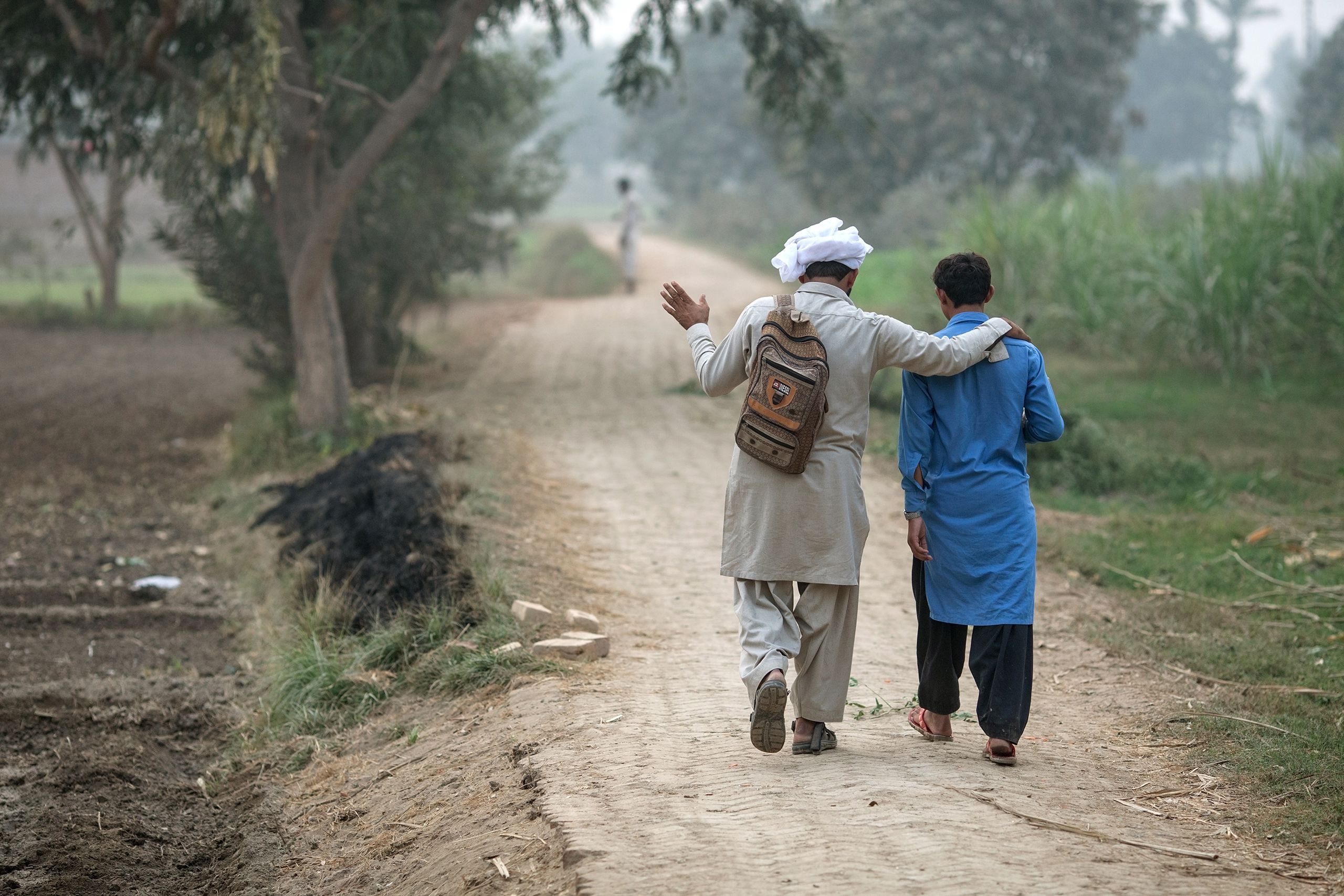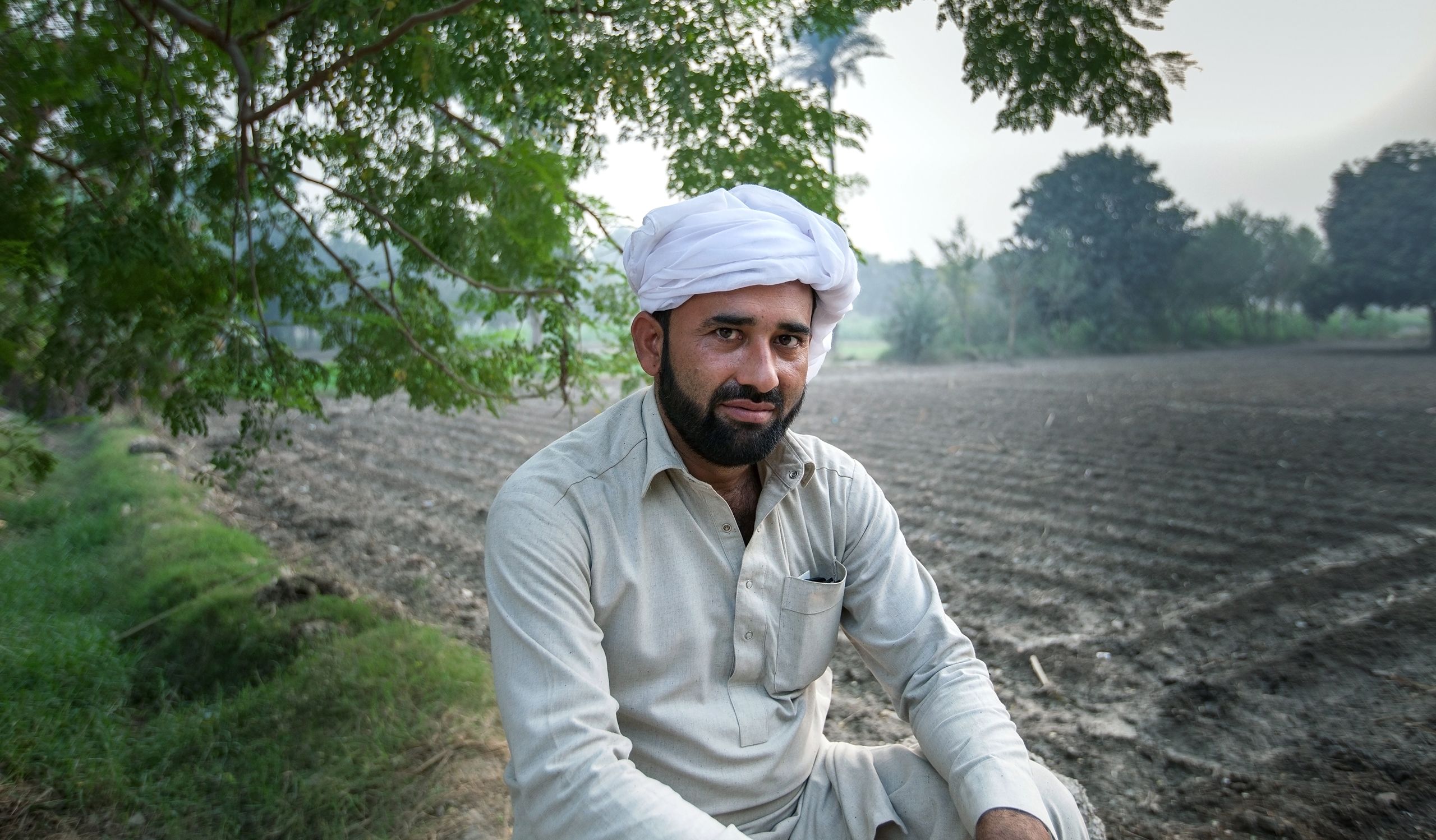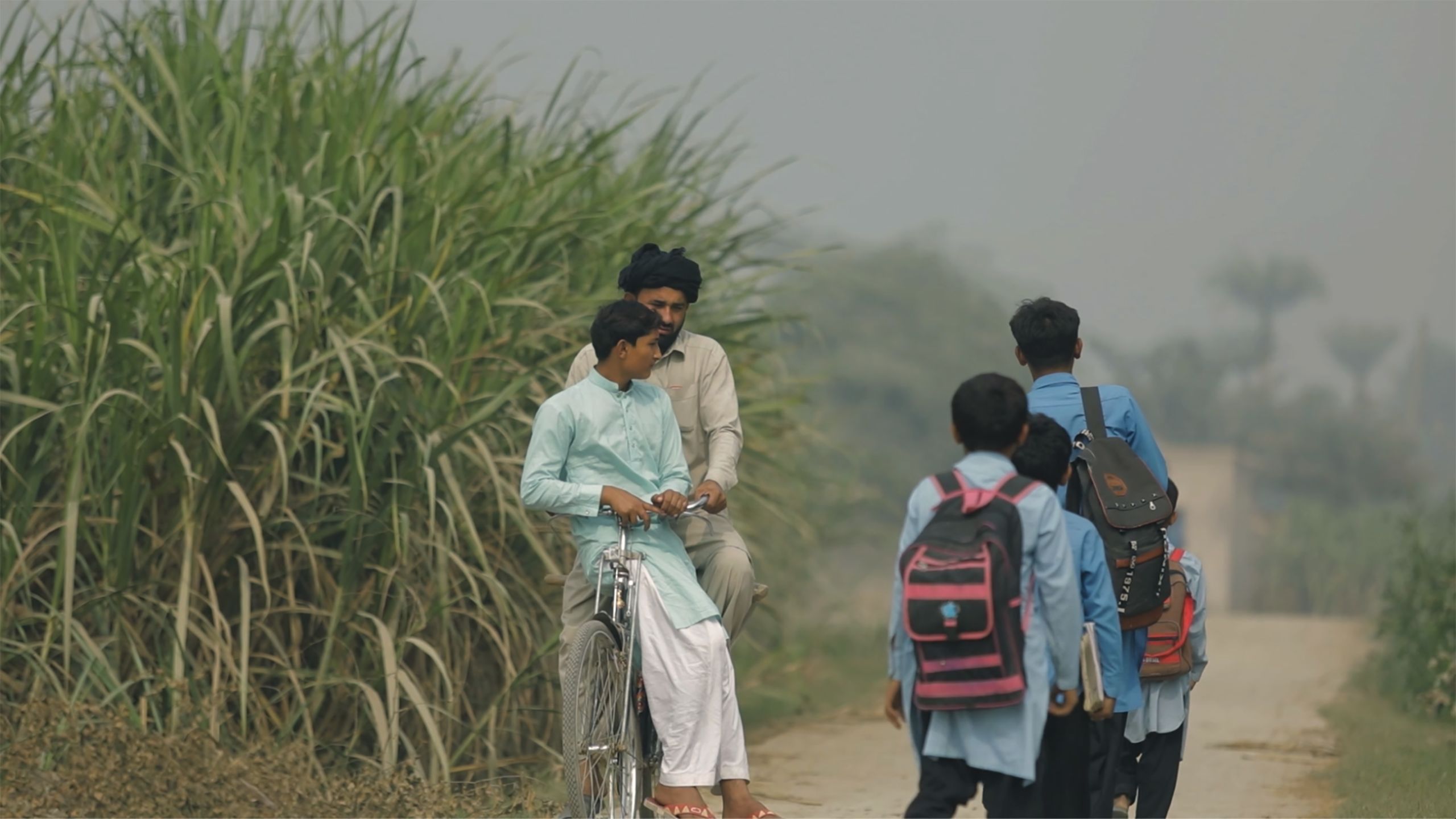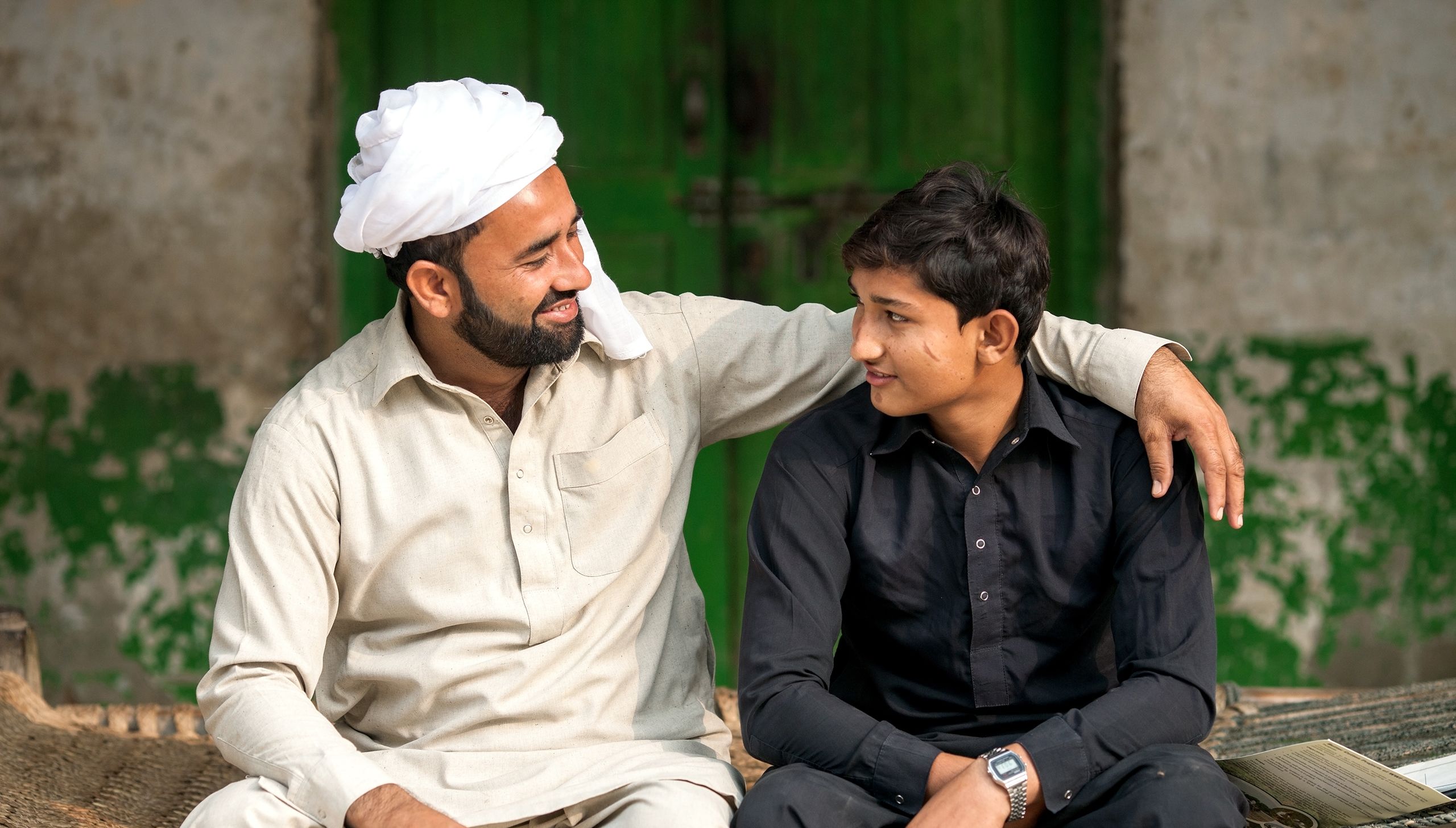Eliminating Child Labour
How Better Cotton Decent Work Training Influenced a Farmer in Pakistan to Send His Son Back to School

In the remote, rural district of Muzaffargarh in Pakistan’s Punjab province, village communities farm the land to survive. Smallholder cotton farmers often rely on their families to lend a hand in the fields, and raise a few cows, buffalo or sheep to earn a living.
Jam Muhammad Saleem is one such farmer. When his eldest son, Muhammad Umar, turned 12, Saleem — considering Umar now old enough to work — saw no choice but for him to leave school to work alongside him and his wife to tend their farm near the village of Jhangar Marha. But just a year later, his outlook changed completely. Now, he is convinced that education will give all five of his children the best start in life.
The reason? Better Cotton training.
Like many farmers in his community, Saleem had feared that without his child’s help on the farm and limited means to pay hired workers, his crop would fail, particularly if attending school encouraged his children to pursue city jobs in the future. Saleem’s children could attend the nearby state-run school for free, but despite free education, Saleem’s mind was made up: Umar would work on the farm. Saleem had himself left school at a young age, and his subsequent struggles with literacy had hindered his ability to keep accurate records and decipher pesticide and fertiliser labels.
Beyond labour challenges, smallholder farmers in Muzaffargarh also face tough growing conditions. Temperatures can reach up to 50°C in summer, while the district’s natural resources, including water from the rivers framing its borders, are dwindling due to the expansion of urban areas. By 2017, Saleem and his family had toiled on their cotton farm for years, their troubles exacerbated by low yields and high costs of inputs, such as pesticides. In particular — because their agricultural knowledge was limited to a traditional approach in cotton farming where they hadn’t been exposed to new, sustainable agricultural techiques — Saleem was sowing unhealthy, untreated home-grown seeds at unfavourable times of year, and did not know how to give his plants the nourishment they needed. He relied heavily on costly synthetic fertilisers and pesticides, and was not able to deliver sufficient water to his plants at the right phase in their growth. He was tired of seeing unhealthy plants and small, poor-quality cotton bolls.
“Every year I saw declining results. I felt quite hopeless. It was an alarming situation and I couldn’t see a way forward.”

In April 2017, Saleem learnt of the Better Cotton programme from our on-the-ground partner, WWF-Pakistan, who explained the opportunities to raise his yield by adopting more sustainable practices like using biological pesticides (made from raw materials sourced from nature). Saleem joined, and learnt valuable farming methods via Better Cotton training sessions – covering everything from the importance of healthy seeds, to efficient water use and more effective ways to control insect-pests (like aphids, that feed on plants’ natural juices).
But it was the Decent Work training that made the greatest impression on Saleem, shifting his perceptions about children’s education for good. Defined by the International Labour Organization (ILO) as work that provides opportunities for people to work productively in conditions of freedom, equity, security and human dignity, Decent Work is central to achieving a Better Cotton licence. A key component is eliminating child labour, particularly where children are involved in heavy or hazardous tasks, such as working with dangerous tools or applying pesticides.
Since leaving school to help his father, Umar had been tasked with many jobs on the family farm, including weeding and tending to livestock, as well as more labour-intesive jobs such as digging and transporting fertilisers by bicycle. A representative from WWF-Pakistan, observing the boy working in the fields, confronted Saleem directly.
“He asked me how my son would be able to grow and contribute to his country, if his health was suffering through working in cotton fields. I saw a dark and deteriorated picture of my son’s future. It was a real turning point for me.”
Jam Muhammad Saleem, 2018.

To overcome resistance from some local farmers in allowing their children to continue their education, our partner WWF-Pakistan invites each Learning Group (a group of approximately 35 Better Cotton Farmers – there are approximately 10 Learning Groups in Saleem’s region) to a series of 10 structured training sessions per season. Child labour features prominently among a number of critical Decent Work topics, including gender equality, equal pay, health and safety, forced labour and non-discrimination. Saleem and the other Better Cotton Farmers in his community learnt how farm work impacts on children’s health and wellbeing, why children should be kept away from pesticides and heavy, hazardous tasks, and explored the value of education as well as national labour laws.
Within the community, WWF-Pakistan organised a day-long seminar for all local Better Cotton Farmers on child labour and sustainable cotton growing, involving village elders and other locally respected figures, including teachers. With community leaders’ support, they sought to inspire children by running spelling competitions, distributing story books among local families and arranging children’s walks in different villages to raise awareness of the importance of education.
As for Umar, just six months after his return to the classroom, his physical health improved and his desire to learn was re-kindled, stimulating his imagination and making him more active and alert. He particularly enjoys maths, and his test results are steadily improving. When he finishes primary school, Umar aims to undertake secondary education. His family are now supportive of his ambition to study science at a university in the future.
“I saw tears in my son’s eyes when I told him we were going to buy him some shoes… school shoes. Now, he is happy, healthy and confident that his dreams will be fulfilled.”
Jam Muhammad Saleem, 2018.

Umar’s enthusiasm for learning has prompted several other families in the village to reconsider their position and send their children to school, too. Overall, however, some families are still reluctant to favour their children’s education over much-needed help in the fields. WWF-Pakistan believe that more time and training is needed to overcome these entrenched attitudes, so that eventually, opting for education becomes the norm.
Seeing how Saleem and other Better Cotton Farmers are improving their livelihoods by adopting sustainable practices could play an important role in this change. After his first Better Cotton harvest in 2018, Saleem increased his yield and profit and is now able to replace Umar’s help in the fields with paid temporary workers. In particular, he increased his income by doubling his yield (compared to the year prior to becoming a Better Cotton Farmer) while saving costs by applying pesticides and fertilisers more efficiently and using more natural alternatives, with Umar’s help in reading the labels and keeping records. Saleem has also begun selling milk from his cattle to create another small revenue stream for the family. As a smallholder farmer facing the growing risk of resource scarcity, climate change and extreme temperatures, his challenges have not ceased. Just this year he has faced an attack from cotton-eating insects at the fruiting stage – but because of the knowledge he has gained since becoming a Better Cotton Farmer, he was better placed to address it and minimise harm to his crop.
“The Better Cotton Programme was like a beam of hope for me. I would like to support all my children in achieving higher education and I believe we have a bright future. I want to extend a big thank you to WWF-Pakistan and Better Cotton for this programme, which has changed my life in so many ways.”
